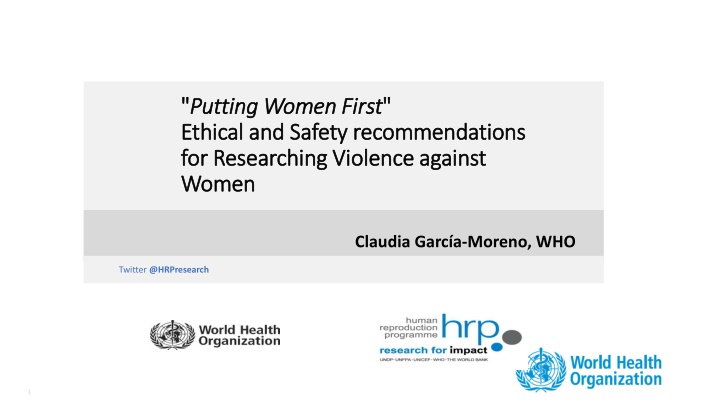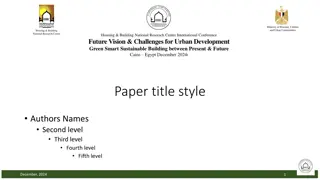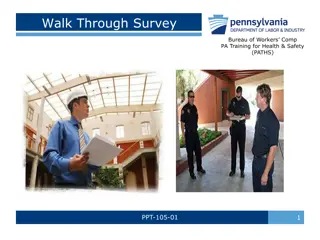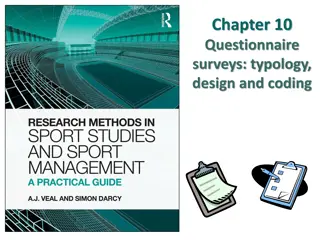
Ethical and Safety Recommendations for Researching Violence Against Women
Explore ethical and safety recommendations for researching violence against women, including rigorous protocols, putting women's safety first, and considerations for ensuring respondent and research team safety during sensitive inquiries. Learn the importance of well-designed studies to address primary aims and minimize under-reporting of violence against women.
Download Presentation

Please find below an Image/Link to download the presentation.
The content on the website is provided AS IS for your information and personal use only. It may not be sold, licensed, or shared on other websites without obtaining consent from the author. If you encounter any issues during the download, it is possible that the publisher has removed the file from their server.
You are allowed to download the files provided on this website for personal or commercial use, subject to the condition that they are used lawfully. All files are the property of their respective owners.
The content on the website is provided AS IS for your information and personal use only. It may not be sold, licensed, or shared on other websites without obtaining consent from the author.
E N D
Presentation Transcript
" "Putting Women First Putting Women First" " Ethical and Safety recommendations Ethical and Safety recommendations for Researching Violence against for Researching Violence against Women Women Claudia Garc a-Moreno, WHO Twitter @HRPresearch 1
Background Background Inquiries into incidents of violence against women (VAW) are very sensitive. Collecting and sharing information on VAW can be dangerous, even life threatening to survivors, communities, and those involved in collecting the information. There are many ethical and safety issues that must be considered and planned for in advance.
Rigorous Protocols Rigorous Protocols Research involving human subjects requires justification Clear research questions Clear justification Benefits outweigh risks Background and literature review to assess and build off prior research Protocols Clear and concise science Theory Methodology Analysis plans Consent procedures that take into account the study population and the sensitive subject matter Build upon current research to minimize under-reporting Plans for adverse events
There is the danger that a well-intentioned but poorly conceptualized or implemented study may result in a serious under-reporting of violence. This raises both ethical and practical concerns. Ethically, it is unacceptable to conduct a poorly designed study that cannot hope to address its primary study aims. Putting Women First Putting Women First
Putting womens safety first in violence research Putting women s safety first in violence research 1. Safety of respondents and research team 2. Studies need to be methodologically sound 3. Confidentiality for safety and data quality 4. Selection and training of team members 5. Actions to reducing distress to respondents 6. Possibilities of referral, support mechanisms 7. Proper interpretation and use of study results 8. Violence questions in other surveys
1. Safety of respondents and research team 1. Safety of respondents and research team Interviews only in a private setting, participant should feel free to reschedule or relocate Frame the study not in terms of violence (but further information should be give as part of consent procedure) Only one woman per household Train interviewers about interruptions Logistics and budget planning should consider respondent and interviewer safety
Community Entry Community Entry Framing the study to the larger community in general terms Framing the study to the household or other unit of select in general terms Use the trusted/contextually appropriate methods for gaining access to the community Only the participants should know the full, sensitive nature of the study Do not leave behind study materials that might alert the community of the full, sensitive nature of the study Unique challenges Heads of household/partners Other study participants
2. Studies need to be methodologically sound 2. Studies need to be methodologically sound Ethically it is unacceptable to conduct a poorly designed study that cannot address the aims Practically too: too low estimates can be used to question the importance of violence Avoid loaded terms as abuse, rape, violence Give attention to wording, length of interview, multiple opportunities for disclosure, etc. Sex, skill, attitude and training of interviewer When results unexpected, discuss findings with key informants, community groups before dissemination
3. Confidentiality for safety and data quality 3. Confidentiality for safety and data quality Address this in training of interviewers; no interviewers working in their own community Confidentiality procedures, consent process Handling of names Presentation of findings: no one community or individual can be identified Handling of photographs
Fieldwork Fieldwork Brazil Brazil
4. Selection and training of team members 4. Selection and training of team members Training should include introduction on gender and violence Training as opportunity for research staff to come to terms with own experiences Addressing emotional needs of team members Role of interviewers: Not counselling, not trying to "save" respondents
Interviewer Training Interviewer Training
Goals of interviewer training Goals of interviewer training To increase sensitivity of participants to gender issues at a personal as well as a community level; To develop a basic understanding of gender-based violence, its characteristics, causes and impact on the health of women and children; To understand the goals of the Multi-Country Study on Women s Health and Domestic Violence; To learn skills for interviewing, taking into account safety and ethical guidelines; To become familiar with the questionnaire and protocol of the Violence against Women Study.
5. Actions to reducing distress to respondents 5. Actions to reducing distress to respondents Ask all questions in supportive and non- judgemental manner (language of questions) Train interviewers to deal with distress Train when and how to terminate interview All interviews should end in a positive manner
Services for Participants in Need Services for Participants in Need Protocols should be in place for participants who need services Should be voluntary Types of services: psychosocial, protective services, medical, police/justice Acute cases may need to be handled differently Be aware and make participants aware of impacts to confidentiality Coordination of referrals and loss to follow-up is critical Consider making these same services available to interviewers Expect low uptake Consider providing a reference list to leave with all participants Violence services should be imbedded in a broader list
"Somehow it made me feel good, because it was something that I had never told anyone before. Now I ve told someone". Respondent, Brazil
6. Possibilities of referral, support mechanisms 6. Possibilities of referral, support mechanisms If possible meet prior to field work with potential providers of support Develop list of resources and offer to all respondents either small enough to be hidden or include a range of other services Where few resources exist, consider having a trained counsellor or women's advocate accompany the teams
7. Proper interpretation and use of study results 7. Proper interpretation and use of study results Research findings should be fed into ongoing advocacy, policy-making and intervention activities Involve advocacy and service groups etc from the beginning as part of research team or advisory committee. Also in use and advocacy Researchers need to be proactive in ensuring that research findings are interpreted appropriately by public and media-
8. Violence questions in other surveys 8. Violence questions in other surveys Considered a second option to a specialized survey due to length and methodological constraints Be aware of the challenges of ensuring data quality and ensuring respondent safety It makes sense only of research team is willing and able to address basic ethical and methodological guidelines.
We were so nave. When we first added questions on violence into our survey on contraceptive use we did nothing special it never occurred to us that we would have problems. Later we found out that three women had been severely beaten for participating in our survey. We felt awful and realized then that we were in over our heads.. (Researcher from Mexico)
I learned a lot from the beginning of the training, till the end of the survey. The survey opened wounds, but I had to learn to face it and cope with it. The respondents really needed and enjoyed this experience My career path changed, because I could do something which can make a difference Interviewer from Namibia
Take home messages Take home messages A population based survey on violence against women should be and can be done ethically and safely It must be undertaken carefully Methodologically rigorous safety of participants paramount Important for researchers to understand and apply recommendations from prior research and to be creative and thoughtful about new directions Important to disseminate results, best practices and lessons learned Women are willing to share experiences with trained and empathetic interviewers
For more information: garciamorenoc@who.int http://www.who.int/reproductivehealth/publications/v iolence/en
INDIVIDUAL CONSENT FORM INDIVIDUAL CONSENT FORM
Informed Consent Informed Consent Statement that the study involves research Purpose and description of procedures Risks Benefits Description of extent of confidentiality and how it will be maintained Contact information for questions/concerns/rights Statement that participation is voluntary and refusal and discontinuation or participation result in no loss of benefit
Hello, my name is *. I work for *. We are conducting a survey in STUDY LOCATION to learn about women s health and life experiences. You have been chosen by chance (as in a lottery / raffle) to participate in the study. I want to assure you that all of your answers will be kept strictly secret. I will not keep a record of your name or address. You have the right to stop the interview at any time, or to skip any questions that you don t want to answer. There are no right or wrong answers. Some of the topics may be difficult to discuss, but many women have found it useful to have the opportunity to talk. Your participation is completely voluntary but your experiences could be very helpful to other women in COUNTRY. Do you have any questions? The interview takes approximately * minutes to complete. Do you agree to be interviewed?
NOTE WHETHER RESPONDENT AGREES TO INTERVIEW OR NOT [ ] DOES NOT AGREE TO BE INTERVIEWED THANK PARTICIPANT FOR HER TIME AND END [ ] AGREES TO BE INTERVIEWED Is now a good time to talk? It s very important that we talk in private. Is this a good place to hold the interview, or is there somewhere else that you would like to go? ____________________________________________________ TO BE COMPLETED BY INTERVIEWER I CERTIFY THAT I HAVE READ THE ABOVE CONSENT PROCEDURE TO THE PARTICIPANT. SIGNED:
Introduction of Section 7 to ask about violence experience When two people marry or live together, they usually share both good and bad moments. I would now like to ask you some questions about your current and past relationships and how your husband / partner treats (treated) you. If anyone interrupts us I will change the topic of conversation. I would again like to assure you that your answers will be kept secret, and that you do not have to answer any questions that you do not want to. May I continue?






















